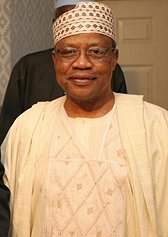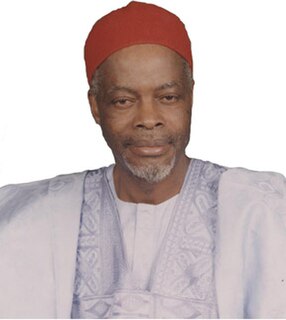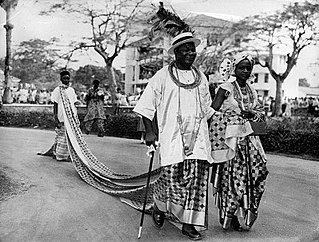
The People's Democratic Party (PDP) is a major contemporary political party in Nigeria. Its policies generally lie towards the centre-right of the political spectrum. It won every Presidential election between 1999 and 2011, and was until the 2015 elections, the governing party in the Fourth Republic although in some cases, amid a few controversial electoral circumstances. Currently, PDP controls 14 states out of 36 states in Nigeria.

The President of the Federal Republic of Nigeria is the head of state and head of the national executive of Nigeria. The President of Nigeria is also the commander-in-chief of the Nigerian Armed Forces. The President is elected in national elections which take place every four years. The first President of Nigeria was Nnamdi Azikiwe, who took office on October 1, 1963. The current President, Muhammadu Buhari took office on May 29, 2015 as the 15th President of the Federal Republic of Nigeria.

Muhammadu Buhari is a Nigerian politician currently serving as the President of Nigeria, in office since 2015. He is a retired major general in the Nigerian Army and previously served as the nation's head of state from 31 December 1983 to 27 August 1985, after taking power in a military coup d'état. The term Buharism is ascribed to the Buhari military government.

Ibrahim Badamasi Babangida, is a retired Nigerian Army General who was President of Nigeria from 27 August 1985 to 26 August 1993. He previously served as the chief of army staff from January 1984 to August 1985. Babangida was a key player in most of the military coups in Nigeria.

Borno, also known as Borno State, is a state in north-eastern Nigeria. Its capital is Maiduguri. The state was formed in 1976 from the split of the North-Eastern State. Until 1991 it contained what is now Yobe State. It is the homeland of the Kanuri people in Nigeria.
The National Council of Nigeria and the Cameroons (NCNC), was a Nigerian political party from 1944 to 1966, during the period leading up to independence and immediately following independence.

The House of Representatives is the lower house of Nigeria's bicameral National Assembly. The Senate is the upper house.

Dr. Chuba Wilberforce Okadigbo, was President of the Senate of Nigeria. He was sometimes referred to as Oyi of Oyi in reference to his local government council area (Oyi); he also held numerous political positions in the Nigeria government. He was a philosopher, academic, political scientist, and writer. He was known to be opposed to the ruling Peoples Democratic Party of Nigeria, which was led by President Olusẹgun Ọbasanjọ from the year 1999 - 2007.

The Fourth Republic is the republican government of Nigeria. Since 1999 it has governed the country according to the fourth republican constitution. It was in many ways a revival of the Second Republic, which was in place between 1979 and 1983 and suffers many of the same problems, such as multiple ministries which made policy planning difficult. Nigeria adopted the constitution of the Fourth Republic on May 29, 1999.

The second Nigerian republic was a brief formation of the Nigerian state which succeeded the military governments formed after the overthrow of first republic.
The Unity Party of Nigeria (UPN) was a Nigerian political party that was dominant in western Nigeria during the second republic (1978-1983). The party revolved around the political leadership of Obafemi Awolowo, a sometimes polemical politician but effective administrator. However, the party's main difference with its competitors was not the leader but the ideals of a social democracy it was founded on. The UPN inherited its ideology from the old Action Group and saw itself as a party for everyone. It was the only party to promote free education and called itself a welfarist party.
Kingsley Ozumba Mbadiwe (1915–1990) was a Nigerian nationalist, politician, statesman and former government minister.

Festus Okotie-Eboh was a Nigerian politician and Minister of Finance during the administration of Sir Abubakar Tafawa Balewa. Okotie-Eboh was born to an Itsekiri Chief, Prince Okotie Eboh in Warri Division, a town along the Benin River in Niger Delta. Before his change of ethnicity, he was Chief Festus Samuel Edah. He was a National Treasurer of the Nigerian First Republic party, NCNC, he was also a leader of the Federal Parliamentary Party of NCNC, replacing K.O. Mbadiwe.
The United National Independence Party (UNIP) was a Nigerian political party formed in the mid-1950s. It was made up of a group of N.C.N.C members who were opposed to some of the policies of Nnamdi Azikiwe and had formed the National Independence Party. In 1954, the National Independence Party merged with Alvan Ikoku's United National Party to form the United National Independence Party.
This is a timeline of Nigerian history, comprising important legal and territorial changes and political events in Nigeria and its predecessor states. To read about the background to these events, see History of Nigeria. See also the list of heads of state of Nigeria.
This article gives an overview of liberalism in Nigeria. It is limited to liberal parties with substantial support, mainly proved by having had a representation in parliament. The sign ⇒ means a reference to another party in that scheme. For inclusion in this scheme, it is not necessary that parties labelled themselves as a liberal party.
This article is about the particular significance of the year 1994 to Nigeria and its people.

The All Progressives Congress (APC) is a political party in Nigeria, formed on 6 February 2013 in anticipation of the 2015 elections. APC candidate Muhammadu Buhari won the presidential election by almost 2.6 million votes. Incumbent President Goodluck Jonathan conceded defeat on 31 March. This was the first time in Nigeria's political history that an opposition political party unseated a governing party in a general election and one in which power transferred peacefully from one political party to another. In addition, the APC won the majority of seats in the Senate and the House of Representatives in the 2015 elections, though it fell shy of winning a super-majority to override the ability of the opposition People's Democratic Party to block legislation.












